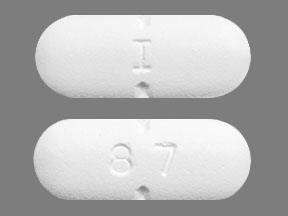Valacyclovir Disease Interactions
There are 4 disease interactions with valacyclovir.
Valacyclovir (applies to valacyclovir) dehydration
Moderate Potential Hazard, Moderate plausibility.
Valacyclovir is almost completely converted to acyclovir and L-valine by first-pass intestinal and/or hepatic metabolism; acyclovir is primarily eliminated by the kidney. Cases of acute renal failure have been reported in patients without adequate hydration. Acyclovir may precipitate in renal tubules when the solubility (2.5 mg/mL) is exceeded in the intratubular fluid. Adequate hydration should be maintained for all patients. If acute renal failure and anuria occur, patients may benefit from hemodialysis until renal function is restored.
Valacyclovir (applies to valacyclovir) hemodialysis
Moderate Potential Hazard, High plausibility.
Valacyclovir is almost completely converted to acyclovir and L-valine by first-pass intestinal and/or hepatic metabolism. About one-third of acyclovir in the body is removed by dialysis during a 4-hour hemodialysis session. The recommended dose of valacyclovir should be administered after hemodialysis.
Valacyclovir (applies to valacyclovir) renal impairment
Moderate Potential Hazard, High plausibility. Applicable conditions: Renal Dysfunction
Valacyclovir is almost completely converted to acyclovir and L-valine by first-pass intestinal and/or hepatic metabolism; acyclovir is primarily eliminated by the kidney. Cases of acute renal failure and CNS side effects (including agitation, hallucinations, confusion, delirium, seizures, and encephalopathy) have been reported in patients with preexisting renal disease who received higher-than-recommended doses of valacyclovir for their level of renal function. Cases of acute renal failure have also been reported in patients receiving other nephrotoxic agents. Therapy with valacyclovir should be administered cautiously in elderly patients (with or without renal dysfunction) and patients receiving other nephrotoxic agents. Dosage reductions are recommended in patients with renal dysfunction. If acute renal failure and anuria occur, patients may benefit from hemodialysis until renal function is restored; valacyclovir should be discontinued if CNS side effects develop.
Valacyclovir (applies to valacyclovir) TTP/HUS
Moderate Potential Hazard, Low plausibility. Applicable conditions: Organ Transplant, Immunodeficiency, Bone Marrow Transplantation, Neutropenia
Thrombotic thrombocytopenic purpura/hemolytic uremia syndrome (TTP/HUS), in some cases resulting in death, has been reported in patients with advanced HIV-1 disease, in allogeneic bone marrow transplant recipients, and in renal transplant recipients during clinical trials of valacyclovir at doses of 8 g/day. Therapy with valacyclovir should be discontinued immediately if clinical signs, symptoms, and laboratory abnormalities consistent with TTP/HUS develop.
Switch to professional interaction data
Valacyclovir drug interactions
There are 92 drug interactions with valacyclovir.
More about valacyclovir
- valacyclovir consumer information
- Check interactions
- Compare alternatives
- Pricing & coupons
- Reviews (497)
- Drug images
- Side effects
- Dosage information
- Patient tips
- During pregnancy
- Support group
- Drug class: purine nucleosides
- Breastfeeding
- En español
Related treatment guides
Drug Interaction Classification
| Highly clinically significant. Avoid combinations; the risk of the interaction outweighs the benefit. | |
| Moderately clinically significant. Usually avoid combinations; use it only under special circumstances. | |
| Minimally clinically significant. Minimize risk; assess risk and consider an alternative drug, take steps to circumvent the interaction risk and/or institute a monitoring plan. | |
| No interaction information available. |
See also:
Further information
Always consult your healthcare provider to ensure the information displayed on this page applies to your personal circumstances.


